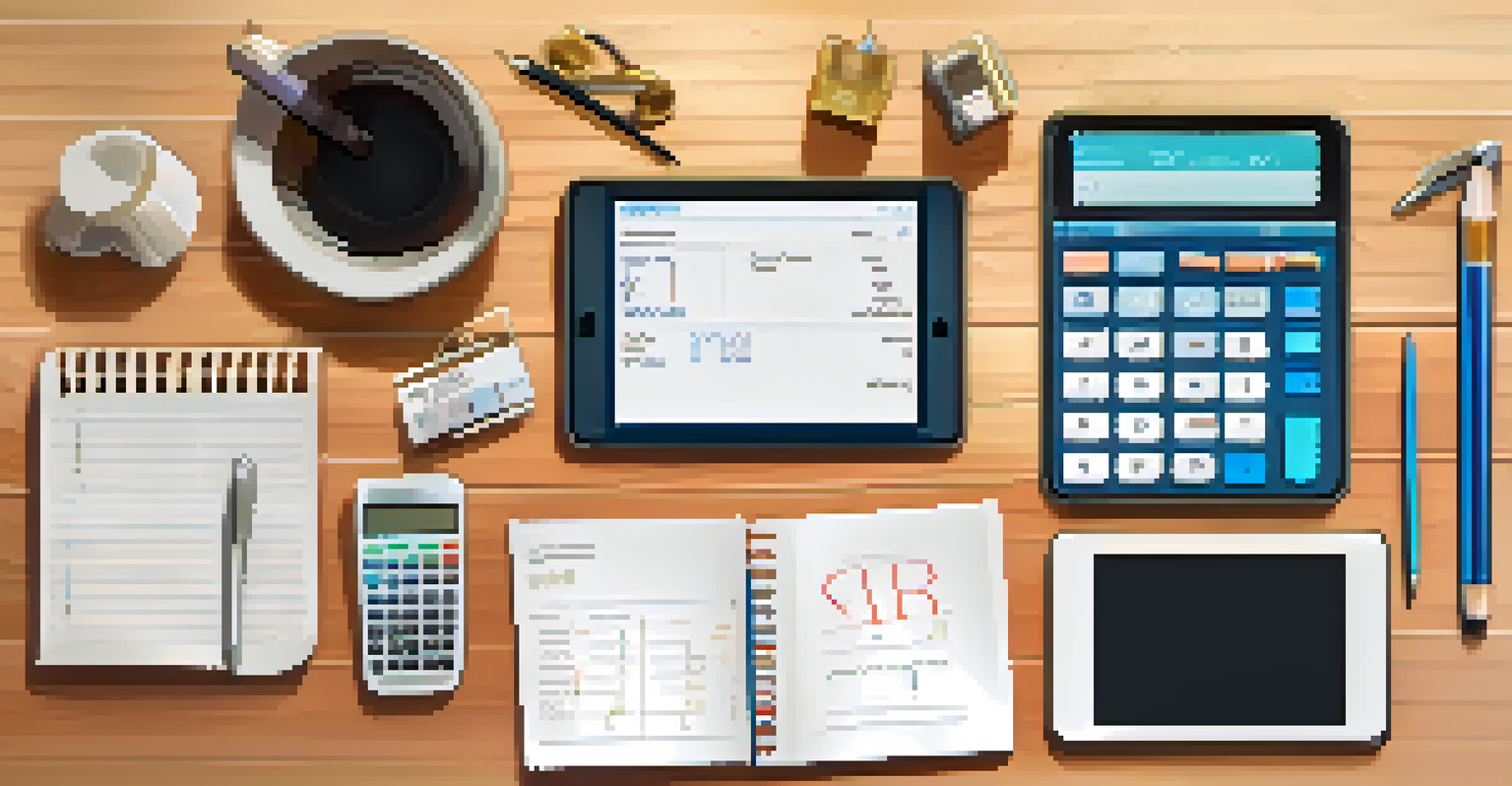How to Keep Accurate Records for Freelance Tax Deductions

Understanding the Importance of Accurate Record Keeping
Accurate record keeping is essential for freelancers, especially when it comes to tax deductions. Without proper records, you risk missing out on valuable deductions that could significantly reduce your taxable income. Think of it like a safety net; it protects you from potential audits and ensures you’re not overpaying the IRS.
The only thing worse than training your employees and having them leave is not training them and having them stay.
When you keep detailed records, you’re not just preparing for tax season—you’re also gaining insights into your business’s financial health. This clarity allows you to make informed decisions, whether it’s adjusting your rates or identifying areas to cut costs. In essence, good record keeping empowers you as a freelancer.
Moreover, with the right records in place, you’ll find tax time becomes much less stressful. Instead of scrambling to gather receipts and invoices at the last minute, you can confidently file your taxes and focus on what you do best: your work.
Choosing the Right Tools for Record Keeping
To effectively manage your freelance records, selecting the right tools is crucial. There’s a plethora of software options available, from simple spreadsheets to comprehensive accounting programs. Tools like QuickBooks or FreshBooks can automate much of the process, saving you time and reducing errors.

If you prefer a more hands-on approach, using cloud storage services like Google Drive can keep your documents organized and accessible from anywhere. You can create folders for different types of expenses, making it easy to locate receipts when needed. Consider also using mobile apps to capture expenses on the go; it’s a game-changer for busy freelancers.
Record Keeping Reduces Tax Stress
Maintaining accurate records helps freelancers maximize deductions and simplifies tax preparation.
Ultimately, the best tool is the one that fits seamlessly into your workflow. Experiment with different options and find what combination of tools helps you maintain accurate records without feeling overwhelmed.
Organizing Your Receipts and Invoices Effectively
A common challenge for freelancers is managing receipts and invoices. Start by developing a consistent method for organizing these documents. Whether you opt for digital storage or physical files, keep everything categorized by month or project to simplify retrieval during tax season.
In this world, nothing can be said to be certain, except death and taxes.
For receipts, consider using an app that allows you to take pictures and store them digitally. This way, you won’t have to worry about losing paper receipts, which can fade or get damaged over time. Plus, digital receipts are easier to search through when you need to find a specific one.
With invoices, maintain a clear record by numbering them sequentially and keeping a log of when they were sent and paid. This not only helps with tracking payments but also serves as a reminder for follow-ups on overdue invoices.
Tracking Business Expenses for Maximum Deductions
Tracking your business expenses is key to maximizing your tax deductions. Common deductible expenses for freelancers include supplies, home office costs, and travel expenses related to work. Keeping a detailed log of these expenses will help you paint a clear picture of your business costs come tax time.
It’s beneficial to separate personal and business expenses. Open a dedicated business bank account and use it exclusively for work-related transactions. This practice not only simplifies record keeping but also strengthens your case in the event of an audit.
Choose Tools That Fit Your Workflow
Selecting the right tools for record keeping can streamline processes and enhance organization.
Additionally, consider using a mileage tracking app if you often drive for work. This way, you can easily log your mileage and ensure you’re claiming every eligible deduction without any guesswork.
Understanding Tax Deductions and Their Eligibility
Freelancers can take advantage of a variety of tax deductions, but understanding which ones you qualify for is crucial. Deductions can vary based on your specific field and the nature of your work. Familiarize yourself with common deductions such as home office expenses, internet costs, and professional development.
Keep in mind that eligibility often hinges on whether an expense is ordinary and necessary for your business. For example, if you purchase software to enhance your skills or improve your services, that expense is likely deductible. However, personal expenses cannot be claimed, so knowing the distinction is essential.
If you’re ever unsure about a specific deduction, consulting a tax professional can provide clarity. They can help you navigate the complexities of tax law and ensure you’re making the most of your deductions.
Staying Up-to-Date with Tax Laws and Changes
Tax laws can change frequently, impacting the deductions available to freelancers. Staying informed about these changes is essential for effective record keeping and tax preparation. Subscribe to reliable tax-related newsletters or follow trusted financial blogs to keep your knowledge current.
Moreover, consider attending workshops or webinars focused on freelance taxation. These can provide valuable insights and strategies to help you adapt to any new regulations. Engaging with a community of fellow freelancers can also be a great way to share experiences and tips.
Consult Professionals for Clarity
Engaging a tax professional can provide personalized guidance that optimizes your tax benefits.
Remember, being proactive about tax law changes not only helps you stay compliant but also ensures you’re taking advantage of every opportunity for deductions. It’s an investment in your freelance business’s financial health.
Consulting a Tax Professional for Personalized Guidance
While DIY tax preparation is an option, consulting a tax professional can provide tailored guidance for your freelance situation. They can help you navigate complex tax regulations and maximize your deductions based on your unique circumstances. This personalized approach can save you time and potentially money in the long run.
A tax professional can also assist with strategic planning throughout the year, rather than just at tax time. By understanding your financial goals and business structure, they can offer advice on how to optimize your records and expenses to benefit you most.

If you’re unsure where to find a qualified tax professional, ask for recommendations from fellow freelancers or look for certified public accountants (CPAs) who specialize in freelance businesses. Having an expert in your corner can alleviate a lot of stress and uncertainty.